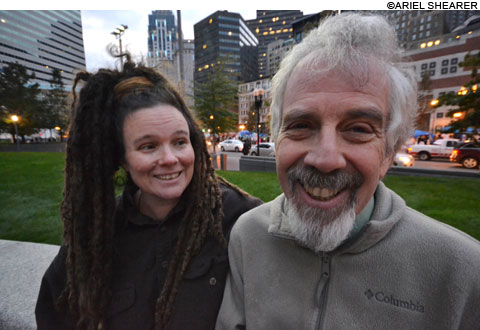
BUTLER VISITED Occupy Boston — also the site of the first Food Not Bombs feed in 1981 — to help protestors learn consensus-building techniques that could help spread their message. |
C.T. Lawrence Butler hasn't been to Boston in nearly a decade. Yet it takes the godfather activist fewer than five seconds to get his bearings when he steps off the train from Baltimore.Emerging from South Station, Butler strides toward Occupy Boston's tent city, wheeling a suitcase filled with books, handouts, and other weapons against mass oppression. A progressive icon who co-founded Food Not Bombs (FNB) in the 1980s, Butler has entangled his five-foot-seven frame in enough police beatings to cause post-traumatic stress disorder. He knows his way around a protest.
Butler came to lend the occupiers support. But now he stops in his tracks. He recognizes the landscape and suddenly realizes he fought on the same battlefield three decades ago.
"This is where it all began," he says, pointing to the Federal Reserve Bank of Boston. "Right over there, on the lawn outside of that big oppressive building, was where we had our first Food Not Bombs feed in March of 1981."
But the association goes far deeper than that coincidence of history. In many ways, the Occupy movement is the flowering of seeds that Butler planted decades ago. He wrote the book on consensus-making — literally. Ideas from his flagship work, On Conflict and Consensus, are staples of the democratic decision-making process as it's practiced in Occupy camps from the Bay Area to Baltimore. Similarly, the 1992 Food Not Bombs handbook, which Butler co-authored with fellow FNB co-founder Keith McHenry, provides a sort of blueprint for large-scale actions like Occupy, in which facilitators are challenged to synthesize wildly diverse groups of varying interests.
As he walks into the camp, no one recognizes him. He's just another protestor. But he can't help but marvel at the manifestation of his life's work.
"I'd like to think that I have something to do with this," he says.
CHARMED LIFE
Butler enjoyed a charmed artistic life until the 1980s. The Delaware-cum-Long Island native lived on Beacon Hill, and helped manage the Charles Playhouse in the nearby theater district. He also produced plays, mostly of the pop-intellectual type, which he put on at Boston Center for the Arts, among other venues. But that all changed on May 24, 1980, when, at the age of 17, he joined thousands of other young people in storming the construction site of the future Seabrook nuclear station.
Three years earlier, in 1977, more than 1400 anti-nuke activists, aligned with the legendary Clamshell Alliance, were arrested for setting up a tent city at Seabrook. The 1980 action that Butler participated in was a last-ditch effort to rekindle the Clamshell legacy by occupying the facility. But New Hampshire state police, along with the National Guard, had a different plan: as soon as protesters sliced through fences and entered the property, troops pounced on the crowd, spraying tear gas and beating people senseless. Butler avoided physical injury, but says the assaults nonetheless left lasting marks.